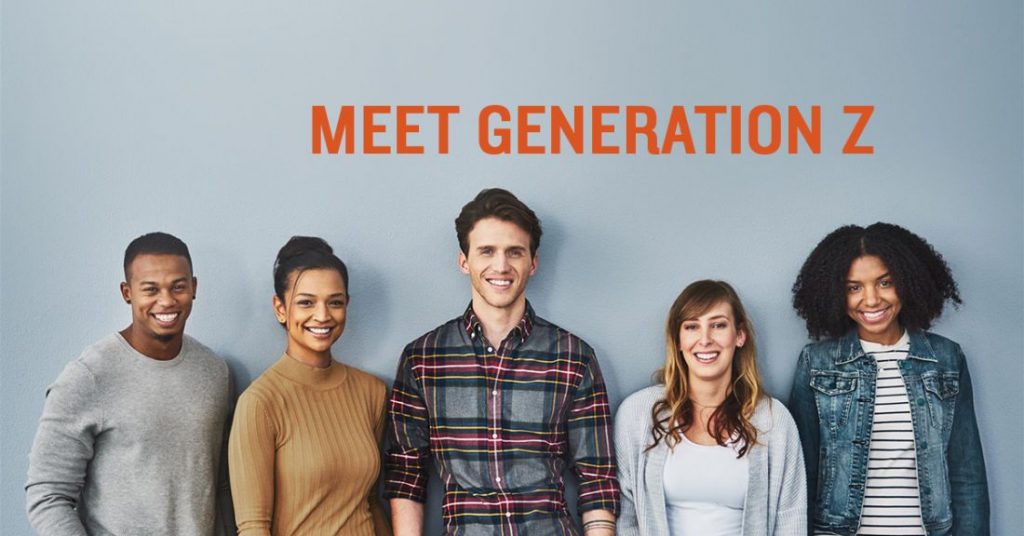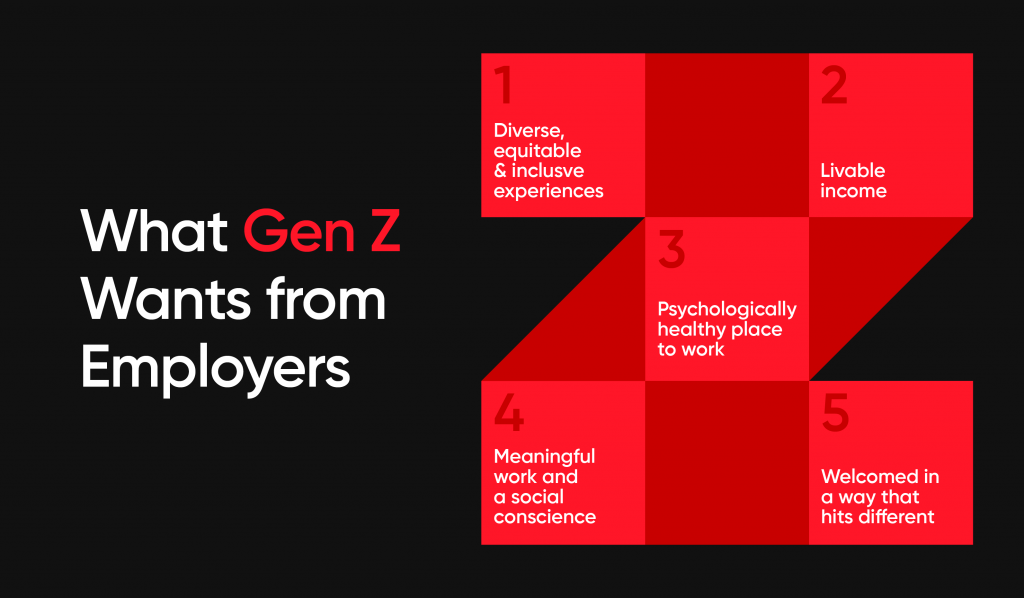Win Over Gen Z by Harnessing Digital and Social Initiatives
BY: ZACK MISKEL | MAY 17, 20212– 5 MIN READ
Key Takeaways (5-minute read)
- By next year, Gen Z will account for one-third of the national population, which accounts for 40% of US spending power.
- They represent the first to build and share a generational global culture thanks to technology connecting them more than any others before.
- Generation Z has shown to be more caring about inclusivity and diversity in branding and marketing.
- Embracing Gen Z employees and their needs can help employers fortify their teams for the next five to ten years.
Last year and in 2020, the A&P team compiled its Millennial Trend Report to discuss how brands could better understand consumers in that market both before and after the COVID-19 pandemic. As the largest consumer demographic in the world currently, Millennials are unique in their contrast to previous generations and in being the first to have lived through a truly pre-digital childhood while fully embracing new technology as adults. Now, as we look to the future of branding and digital experiences, Generation Z is at the helm of consumer trends moving into the mid-2020s. 
“By next year, Gen Z will account for one-third of the national population, which accounts for 40% of US spending power,” according to the LA Times. “It’s time to change with the times and generations, because their voice and power are undeniable.”
Exploring Gen Z as a consumer group but also as an employee market is truly unique, as they represent the first ones to build and share a generational global culture thanks to technology connecting them more than any others before. This cultural shift will surely affect consumer trends more and more in the coming years, as well as societal norms in the near future while more Zoomers enter the workforce.
We’re seeing a definite shift among younger generations toward what’s “real.” While Millennials and Gen Z appreciate that technology can give rise to further innovation, there is currently a stronger trend among them toward wanting what is nostalgic and tangible. Brands must find a way to create a “happy medium” through digital experiences that promote authenticity and true connection rather than shallow promotion and overly edited aesthetics.
As outlined in Business Insider’s “The Best Brands According to Gen Z,” seven out of the top 10 brands on the list of 50 are digital-focused companies, including the big three of Amazon, Google, and Apple. But social connection, content streaming, and gaming also make a significant portion of the top 10 with Discord, Sony Playstation, Netflix, and Spotify among the ranks. This suggests that Gen Z enjoys engaging with new technology and the convenience of digital retailers and content platforms. Discord’s inclusion suggests they are also seeking community and connection, something that brands can certainly tap into when marketing to this demographic.
Generation Z has also shown to be more caring about inclusivity and diversity in branding and marketing. In a qualitative research project last year for our client, , our agency spoke to Gen Z and Millennial consumers on the effect a company’s ethics and behavior have on their willingness to purchase. An overwhelming majority said it did. A large portion actively researched a company’s history and mission before purchase, and the remaining would stop giving a company business if they heard about a flagrant violation or bad practice. They also saw social responsibility programs, inclusivity, and a humanity-driven mission statement not as a plus but as a requirement, the norm.
According to the Insider Intelligence and eMarketer rapport The Evolving Role of the CMO, Gen Z consumers care more than their predecessors about fairness and diversity from brands. Up 5% from Millennials and over around 30% from seniors and Baby Boomers, 62% of Gen Z said that negative treatment/statements concerning diverse communities would compel them to avoid certain brands. Similarly, they were more apt to shun brands without products that are inclusive/easily used by people of different abilities (54%, compared to 48% of Millennials and 28% of Boomers) and to turn away from brands with a lack of diverse marketing and advertising (54%, compared to 42% of Millennials and 22% of Boomers). Brands should keep this in mind when creating a mission statement, advertising materials, commercials, creative, and digital marketing. Being inclusive to all races and ethnicities, cultures, genders, sexualities, and levels of ability will give brands not only a better report with Gen Z consumers but also a clearer stance on corporate social responsibilities, which studies show is increasingly important to today’s consumer—not to mention it’s just good business.
Learn more about the massive overall shift toward Social Justice in Branding in the latest trend report from our parent brand studio, Antonio & Paris, releasing later this month.
 This shift toward inclusive clothing for all genders, for example, is particularly relevant in millennial and Gen Z audiences, as evidenced on social media platforms like TikTok and Instagram: “TikTok has been a platform that has really grown the inclusivity conversation,” said Rachael Robbins Kachko, a merchandising strategist for women’s clothing at consumer insights agency Tobe TDG. “We’ve seen that from Instagram for a while.” Brands that really want to gain favor with Gen Z consumers should consider moving some digital experiences to these platforms if they haven’t already—and consider having their team in charge of such initiatives be Millennial and Gen Z employees who already know and care about the medium.
This shift toward inclusive clothing for all genders, for example, is particularly relevant in millennial and Gen Z audiences, as evidenced on social media platforms like TikTok and Instagram: “TikTok has been a platform that has really grown the inclusivity conversation,” said Rachael Robbins Kachko, a merchandising strategist for women’s clothing at consumer insights agency Tobe TDG. “We’ve seen that from Instagram for a while.” Brands that really want to gain favor with Gen Z consumers should consider moving some digital experiences to these platforms if they haven’t already—and consider having their team in charge of such initiatives be Millennial and Gen Z employees who already know and care about the medium.
Gen Z have made a significant impact on social norms already, not only as consumers but also as employees as more of them enter the workforce full-time.
“Gen-Z has grown up with digital information at their fingertips and access to social media to develop and express their opinions,” says Casey Welch, the CEO and cofounder of Tallo employment research company. “This has impacted their expectations of future employers tremendously.”
COVID-19 also had an impact. According to the Harris Poll Gen Z 100, “Given the disruption Gen Z has already witnessed, they are more likely to reject the notion of BAU (business as usual) and be attracted to companies that prioritize mental health and productivity on an individual level, whether that be achieved by working from home or flexible hours.”
Deloitte Global’s 2021 Millennial and Gen Z Survey expounds that, “Millennials and Gen Zs, on the whole, seem more persistent, more vocal, and more apt than others to question and even upset the status quo. These generations believe in the power of individuals to create change. Even though they want institutions to do more and aren’t hesitant to call for government intervention to fix what they can’t, they embrace personal responsibility. It’s evident in their approach to everything from the pandemic to social justice—an approach that has real ramifications for employers, retailers, and every other organization and institution.”
 More Gen Z Employee Stats from Forbes state that this generation wants real connection with employers, are more likely to take a “dream” position with an unknown brand over a mediocre position with a well-known one, plan to stay at their first job longer than millennials, prefer to work remotely, and want diversity in the workplace just as we have seen they want from the brands they follow and support.
More Gen Z Employee Stats from Forbes state that this generation wants real connection with employers, are more likely to take a “dream” position with an unknown brand over a mediocre position with a well-known one, plan to stay at their first job longer than millennials, prefer to work remotely, and want diversity in the workplace just as we have seen they want from the brands they follow and support.
Brands that embrace the needs of their youngest employees should see a return on that investment in the form of loyalty, new ideas, and enthusiasm for their work. Considering these returns can help employers fortify their teams for the next five to ten years as Gen Zs become a significant portion of the workforce across all industries. Their love and understanding of technology offers an unbeatable opportunity for brands to innovate early on by letting Gen Z take the reins of projects and initiatives such as digital experiences, social media, and creative design.
For more insights on consumers of all demographics and the futurist’s view on trends in branding, marketing, and digital experiences, get in touch with the team at Digital Caliente and Antonio & Paris today. We would love to chat about how your brand can build the connection between your brand and consumers to grow your business.

WRITTEN BY
Zack Miskel
Short Bio — Zack joined the Antonio & Paris team at the beginning of 2019 after spending the previous five years running two start-up companies in the Bay Area. Now a strategist, Zack works alongside the strategic planning team at Antonio & Paris to deliver a big-picture perspective for clients such as MINI USA, Barco (Belgium), and Brookdale Senior Living, to name a few.

WRITTEN BY
Zack Miskel
Short Bio — Zack joined the Antonio & Paris team at the beginning of 2019 after spending the previous five years running two start-up companies in the Bay Area. Now a strategist, Zack works alongside the strategic planning team at Antonio & Paris to deliver a big-picture perspective for clients such as MINI USA, Barco (Belgium), and Brookdale Senior Living, to name a few.
